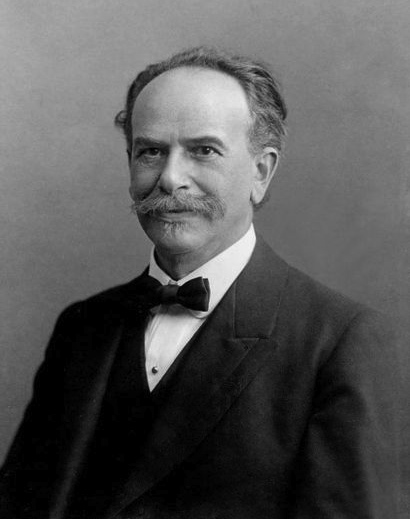フランツ・ボアズの文化理論
Cultural
theory of Franz Boas

フランツ・ボアズの文化理論
Cultural
theory of Franz Boas

Franz Uri Boas, 1858-1942
フランツ・ボアズ(Franz Uri Boas, 1858-1942)関連年譜(→年譜作成につかった原資料はこちら) あるいは当サイトの年譜などを参照してください。
フランツ・ボアズの文化理論の特徴は、おおきく、つぎの3点に特徴づけ られる(太田『メイキング人類学』の記述参照)。
1)人類学における進化主義(進化論)的 発想を批判した。
2)人種(=人類集団の生物学的遺伝子組 成の偏り)は、決して文化や言語を決定しない、ことを明らかにした。
3)広域的に調査し、その結果をさまざま なジャンルの民族誌記述として残した。
その中でもっとも有名で、かつアメリカの
人類学を特徴づけるものとして「文化相対主
義」
があげられる。ボアズは直接、文化相対主義という用語を使ったことがないが、彼の死後、ボアズの弟子(学生)た
ちにより使われた。しかし、文化相対主義への違和感のピークは、第二次対戦中の戦争を遂行に協力していた人類学研究に対する違和感として表明された。その
初出は1948年の『アメリカン・アンソロポロジスト』(ジュリアン・スチュアード(Julian Haynes
Steward, 1902-1972)「人
権の表明へのコメント」)だと言われている。Julian H. Steward, Comments on the Statement
on Human Rights. American Anthropologist. New Series, Vol. 50, No. 2
(Apr. - Jun., 1948), pp. 351-352 (2 pages).
| "The subsequent
refusals to own the Universal Declaration, typically by the new
political and military elites in Asia and Africa, made Herskovits’s
statement nothing short of prescient. Much trouble may have been
averted had the authors of the Declaration attended to his concerns. Be
that as it may, the lesson for anthropology is to recognise how such
reflections on the historically contingent nature of so-called
universal declarations do not necessarily amount to cultural and moral
relativism (Dembour 2001; Goodale 2009b: 40-64). As an anthropologist
associated with the teachings of Franz Boas, an advocate of ‘cultural
particularism’ in American anthropology, Herskovits is too easily given
the epithet ‘relativist’ (Simpson 1973). Would a relativist point out
that cultural differences actually became a means of governing
colonised people, so much so that ‘the hard core of similarities
between cultures [were] consistently overlooked’ (AAA 1947: 540,
original emphasis)? This acknowledgement that similarities across
obvious differences carried subversive potential hardly warrants a
reputation for relativism. Rather, the question posed by these early
disciplinary reflections on human rights is what anthropology’s
sensibility to human diversity and historical contingency amounts to
when it is not dismissed as cultural and moral relativism." |
その後、アジアやアフリカの新しい政治・軍事エリートが世界宣言を所有
することを拒否したため、ハースコビッツの発言はまさに先見の明があったというほかはない。宣言の作成者が彼の懸念に耳を傾けていれば、多くの問題は回避
されたかもしれない。それはともかく、人類学にとっての教訓は、いわゆる普遍的宣言の歴史的偶発性に
ついてのこうした考察が、必ずしも文化的・道徳的相対主義につながらないことを認識する ことである(Dembour 2001; Goodale
2009b: 40-64)。アメリカ人類学における「文化的特殊主義」の提唱者であるフランツ・ボースの教えを受け継ぐ人類学者として、ハー
スコヴィッツはあまりにも簡単に「相対主義者」(Simpson
1973)という蔑称を与えられている。相対主義者は、文化の違いが実際に植民地化された人々を統治する手段となったため、「文化間の類似性というハード
コアは(中略)一貫して見落とされてきた」(AAA 1947: 540,
原文ママ)と指摘するだろうか。このように、明らかな差異を超えた類似性が破壊的な潜在力を秘めていることを認めることは、相対主義に対する評価を正当化
するものではありません。むしろ、人権に関するこれらの初期の学問的考察が提起している問題は、人間の多様性と歴史的偶発性に対する人類学の感受性が、文
化的・道徳的相対主義として排除されない場合、どのようなものになるのかということである。 |
| Human Rights, the Cambridge
Encyclopedia of Anthropology. |
www.DeepL.com/Translator |
| In a way Boas's anthropological
career can be characterized as a process in which the original axiom,
the human construction of experience, was btransposed from the
psychological level to the cultural. Stocking singles out the early
(1889) paper "On .Alternating Sounds'" as containing the germs of that
development, and so of the modern concept of culture. More than a
critical or methodological exercise, Stocking writes, this paper
foreshadows a great deal of modern anthropological thought on
"culture." At least by implication, it sees cultural phenomena in terms
of the imposition of conventional meaning on the flux of experience. It
sees them as historically conditioned and transmitted by the learning
process. It sees them as determinants of our very perceptions of the
external world. And it sees them in relative rather than absolute
terms.Much of Boas' later work, and that of his students after him, can
be viewed simply as the working out of implications present in this
article. [Ibid., p. 159; emphases mine] |
ボアズの人類学的キャリアは、ある意味で、人間が経験を構築するという
原初的な公理が、心理的なレベルから文化的なレベルへと移行する過程として特徴づけることができる。ストッキングは、ボアズの初期(1889年)の論文
「交互の音について」を、その発展の萌芽、ひいては現代の文化概念の萌芽として取り上げている。この論文は、批評や方法論の演習というよりも、「文化」に
関する現代の人類学的思考の多くを予見していると、ストッキングは書いている。少なくとも暗黙の了解として、この論文は文化現象を、経験の流動性に慣習的
な意味を付与するという観点から捉えている。また、文化現象を歴史的に条件づけられ、学習プロセスによって伝達されるものとしてとらえている。また、外界
に対するわれわれの認識そのものを決定するものとしてとらえる。ボアスのその後の研究の多くは、また彼以降の弟子たちの研究は、この論文に示された含意の
実現とみなすことができる。 |
| In fact, the paths by
which Boas reached the cultural concept were diverse and sometimes
circuitous (cf. Stocking 1968, pp. 195-223; 1974, pp. 1-20). One of
these is of special relevance here, as it developed from direct
confrontation with Morgan on the issue of general laws of social
evolution. Modern anthropology tends on balance to consider this
particular controversy unfortunate, for the nominalist fragmentation
operated by Boas on the content of cultures to prove the diversity of
developmental processes enshrined that "shreds and patches" conception
of the object that American ethnology would spend decades in expiating.
Indeed, [Paul ]Radin early and vigorously criticized the "quantitative"
notion of the detached culture trait which Boas had developed out of
his obsession with disproving evolutionism (Radin 1966 [1933]). Yet the
negative dismemberment of culture had to generate a contradictory and
synthetic result. What had rationalized for Boas the disparity of
apparently similar traits, as they actually existed in various
societies, were the differences in meanings and uses locally assigned.
If these meanings implied dissimilar processes of development, and
hence proved Morgan wrong, it was by their implication also of a total
and oriented context: a culture that patterned the traits according to
its own unique genius. Since Boas argued that the masks of society A,
used to deceive the spirits, were not comparable to the masks of
society B which commemorated the ancestors-and similarly that clans,
totems, or moiety systems varied the world over-he had to conclude the
existence of cultures: of totalities whose "dominant ideas" or patterns
create this differentiation (Boas 1966b [1940], pp. 270-89, and passim). |
実際、ボアズが文化概念に到達するまでの道は多様であり、時に迂遠なも
のであった(Stocking 1968, pp.195-223; 1974,
pp.1-20参照)。そのうちの一つは、社会進化の一般法則の問題でルイス・ヘンリー・モーガンとの直接対決から発展したものであり、ここでは特別な関
連性を持っている。現代の人類学は、この論争を不幸なものとみなす傾向がある。なぜなら、発達過程の多様性を証明するために、ボアスが文化の内容に対して
行ったノミナリスト的な断片化は、アメリカ民族学が数十年をかけて追放した「細切れとつぎはぎ」の対象概念を根付かせるからである。実際、[Paul]
Radinは、進化論を否定しようとする強迫観念からボアズが開発した、切り離された文化の特徴という「量的」概念を早くから精力的に批判した
(Radin 1966 [1933]
)。しかし、文化の否定的な分断は、矛盾した合成的な結果を生み出さざるを得なかった。ボアズにとって、様々な社会で実際に存在する一見類似した形質の不
一致を合理化したのは、地域的に付与された意味と用途の違いであった。もし、これらの意味が、異質な発展の過程を暗示し、それゆえ、モーガンが間違ってい
ることを証明したとすれば、それは、全体的かつ方向づけられた文脈、すなわち、独自の天才に従って形質をパターン化する文化をも暗示するものであったので
ある。ボアズは、精霊を欺くために使われる社会Aの仮面は、祖先を記念する社会Bの仮面とは比較にならない、同様に、氏族、トーテム、半族は世界各地で異
なっていると主張したので、文化の存在を結論づけなければならなかった:その「支配概念」あるいはパターンがこの差異を生み出す全体性のこと(Boas
1966b [1940], pp.270-89 and passim)。 |
| https://www.deepl.com/ja/translator |
このつづきは「文化相対主義」で〜♪

■文化相対主義に対する異論
◎Julian H.
Steward, Comments on the Statement
on Human Rights. American Anthropologist. New Series, Vol. 50, No. 2
(Apr. - Jun., 1948), pp. 351-352
| When the Executive
Board was instructed to draft a "Statement on Human
Rights," it was, I believe, generally understood that any political
stand or value judgment
should be avoided. The Board has obviously made every effort to limit
the
Statement to scientifically supportable assertions, but it seems clear
now that it was
asked to do the impossible. I am led to this conclusion not only by my
own thinking,
but by discussions which I have heard. |
理
事会が「人権に関する声明」を作成するように指示されたとき、政治的な立場や価値判断は避けるべきであるというのが一般的な理解であったと思う。理事会
は、この「声明」を科学的に裏づけのある主張に限定するためにあらゆる努力を払ったことは明らかであるが、今となっては、不可能を可能にすることを求めら
れていたように思えます。この結論は、私自身の考えだけでなく、私が耳にした議論からも導き出されています。 |
| If the plea that cultural values
be respected means merely that the primitive
peoples, who are on the receiving end of civilizing influences, be
treated with greater
understanding and tolerance, there can be little objection to it. To be
universally
valid, however, the Statement must apply equally to the cultural values
which underlie
the internal policies and motivate the foreign affairs of the civilized
nations. I should
doubt that, in urging that values be respected because "man is free
only when he lives
as his society defines freedom," we really mean to approve the social
caste system of
India, the racial caste system of the United States, or many of the
other varieties of
social discrimination in the world. I should question that we intend to
condone the
exploitation of primitive peoples through the Euro-American system of
economic imperialism,
while merely asking for more understanding treatment of them: or, on
the
other hand, that we are prepared to take a stand against the values in
our own culture
which underly such imperialism. |
文
化的価値の尊重という主張が、単に文明化の影響の受け手である未開人への理解と寛容さをもって接するという意味であれば、ほとんど異存はないだろう。しか
し、この声明が普遍的に有効であるためには、文明国の国内政策の根底にあり、外交問題の動機となる文化的価値観にも同様に適用されなければならない。人間
は、自分の社会が定義する自由に従って生きるときにのみ自由である」という理由で、その価値を尊重するよう促すことが、本当にインドの社会カースト制度や
米国の人種分離政策、あるいは世界にあるさまざまな社会差別を認めることになるのか、私は疑わなければならない。また、ヨーロッパ・アメリカの経済的帝国
主義による原始民族の搾取を容認し、彼らへの理解を求めるだけなのか、それとも逆に、そうした帝国主義の根底にある自国文化の価値観に反対する立場を取る
用意があるのか、疑問に思うところである。 |
| As "respect for cultural
differences" certainly does not advocate tolerance of the
values in Nazi Germany, where the "individual ... [realized] his
personality" through
the Youth movement, a qualification is introduced (p. 543) that seems
to contradict
the basic premise and to be incompatible with anthropological thinking.
"Even where
political systems exist that deny citizens the right of participation
in their government,
or seek to conquer weaker peoples, underlying cultural values may be
called on to bring
the peoples of such states to a realization of the consequences of the
acts of their governments,
and thus enforce a brake upon discrimination and conquest." This may
have
been a loophole to exclude Germany from the advocated tolerance, but it
looks to me
like the fatal breach in the dyke. Either we tolerate everything, and
keep hands off, or
we fight intolerance and conquest-political and economic as well as
military-in all
their forms. Where shall the line be drawn? As human beings, we
unanimously opposed
the brutal treatment of Jews in Hitler Germany, but what stand shall be
taken on the
thousands of other kinds of racial and cultural discrimination, unfair
practices, and
inconsiderate attitudes found throughout the world? |
「文
化的差異の尊重」は、確かにナチス・ドイツにおける「個人......を実現する」価値観の許容を擁護するものではない。青年運動を通じて「個人を実現す
る」ナチス・ドイツの価値観に寛容になるわけではないとして、大前提と矛盾するような、人類学的思考と相容れないような修飾を導入している
(p.543)。「市民が政府に参加する権利を否定したり、弱い民族を征服しようとする政治体制が存在する場合でも、そのような国家の民に政府の行為の結
果を認識させ、差別や征服に歯止めをかけるために、根本的な文化的価値が求められることがある」。
これは、提唱された寛容の対象からドイツを除外するための抜け道だったのかもしれないが、私には堤防の致命的な裂け目のように見える。すべてを容認し、手
を出さないか、それとも不寛容と征服-政治的、経済的、そして軍事的なあらゆる形態で-と戦うか。その線引きはどこにあるのだろうか。ヒトラー・ドイツに
おけるユダヤ人の残虐な扱いには、人間として全員一致で反対した。しかし、世界中に存在する何千もの他の種類の人種的・文化的差別、不公平な慣習、思いや
りのない態度には、どのような態度を取るべきなのだろうか? |
| What are these "underlying
cultural values" that can be used to suppress intolerance
and promote political freedom in cultures which lack economic or social
freedom,
or that can be used to halt conquest in a competitive world? Even if
there were agreement
on objectives, it would take some pretty fancy handling to revamp the
portions
of cultures which are disapproved. I had thought that anthropologists,
of all people,
stressed the interrelatedness of cultural values and patterns. |
経
済的・社会的自由を欠いた文化圏で不寛容を抑え、政治的自由を促進するために、あるいは競争社会で征服を阻止するために利用できる「根底にある文化的価
値」とは何だろうか。仮に目的について合意があったとしても、不承認となった文化の部分を改めるには、かなり奇抜な操作が必要だろう。人類学者は、文化的
な価値観やパターンの相互関連性を強調するものだと思っていた。 |
| Without committing itself to
particulars, the Statement is a value judgment any
way it is taken. If it does not advocate tolerance for all cultural
values, no matter how
repugnant some of them may be to us as individuals, then it must imply
disapproval
of some cultural values, though it also says that we have no scientific
basis for making
any value judgments. |
こ
の声明は、特定の事柄にこだわることなく、どのように受け止めても価値判断となる。もしこの声明が、すべての文化的価値観に対して寛容であることを主張し
ないのであれば、たとえそれが私たち個人にとってどんなに忌まわしいものであっても、いくつかの文化的価値観に対しては不支持されることを意味するはずで
ある。 |
| The conclusion seems inescapable
that we have gotten out of our scientific role
and are struggling with contradictions. During the war, we gladly used
our professional
techniques and knowledge to advance a cause, but I hope that no one
believes that he
had a scientific justification for doing so. As individual citizens,
members of the Association
have every right to pass value judgments, and there are some pretty
obvious
things that we would all agree on. As a scientific organization, the
Association has no
business dealing with the rights of man. I am sure that we shall serve
science better,
and I daresay we shall eventually serve humanity better, if we stick to
our purpose.
Even now, a declaration about human rights can come perilously close to
advocacy of
American ideological imperialism. |
そ
の結論は、私たちが科学的な役割から外れてしまい、矛盾に苦しんでいることは避けられないようである。戦争中、私たちは喜んで専門的な技術や知識を駆使し
て大義を推進しましたが、そのことに科学的な正当性があったとは誰も思っていないことを望むのである。個々の市民として、学会のメンバーは価値判断を下す
権利があり、誰もが同意するようなごく当たり前のこともある。科学的な組織として、学会は人間の権利を扱う仕事はしていない。私たちの目的を貫けば、きっ
ともっと科学に貢献し、やがては人類に貢献できるはずである。現在でもなお、人権についての宣言は、アメリカのイデオロギー的帝国主義の擁護に危うく近づ
くことがあるのだ。 |
| https://www.jstor.org/stable/664192?seq=1 |
https://www.deepl.com/ja/translator |
その他の情報
Copyleft, CC, Mitzub'ixi Quq Chi'j, 1996-2099
Copyleft, CC, Mitzub'ixi Quq Chi'j, 1996-2099
☆
 ☆
☆